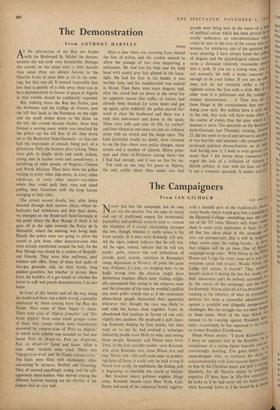The Demonstration
From ANTHONY HARTLEY
PARIS
Athe intersection of the Rue des Ecoles with the Boulevard St. Michel the demon- stration did not look very formidable. Perhaps the crowds on the street were a little heavier than usual (they are always heavier in the Quartier Latin in term time at six in the even- ing), but that was all. It seemed impossible that less than a quarter of a mile away there was to be a demonstration in favour of peace in Algeria or that trouble should be confidently expected.
But, walking down the Rue des Ecoles, past the Sorbonne and the College de France, past the hill that leads to the Pantheon on the right and the small streets down to 'the Seine on the left, the crowds became thicker. Soon they formed a moving mass, which was canalised by the police—up the hill first of all, then down on to the Boulevard Saint-Germain—so that one had the impression of already being part of a procession. Only the banners were lacking. There were girls in bright skirts and suede jackets, young men in leather coats and canadiennes, a sprinkling of older people, of Negroes, Chinese and North Africans. Then there were the police waiting in every other side-street, in every other cul-de-sac, in every other square—anywhere where they could park their vans and stand pulling their Gauloises with the long batons swinging at their sides.
The crowd moved slowly, but, after being directed through dark narrow alleys, whose in- habitants had withdrawn and shut their doors, we emerged on the Boulevard Saint-Germain at the point where the Rue Monge (1 think it is) goes off to the right towards the Palais de la Mutualite, where the meeting was being held. Plainly the police were not going to allow the crowd to join those other demonstrators who were already established around the hall, for the Rue Monge was closed by a cordon of Republi- can Guards. They wore blue uniforms, steel helmets and rifles. Some of them had sacks of tear-gas grenades and, on their hands, long padded gauntlets, but whether to protect them from the backfire of a gas bomb or whether the better to cuff and punch demonstrators I do not know.
In front of this barrier and all the way along the boulevard there was a thick crowd, constantly reinforced by those coming from the Rue des Ecoles. Now some of them began to shout. There were cries of 'Algerie francaise' and 'De- fends Algerie' from some small groups—some of them very young—which were immediately answered by counter-cries of 'Paix en Algerfe,' in which each syllable was scanned so that one heard 'Paix en Al-ger-rie, Paix en Al-ger-rie, Paix en Al-ger-rie' faster and faster. After a time other variants were tried. There was Weg-go-ci-at-si-on' and `De Gaulle neg-goc-d-ez: The faces were filled with excitement, often amounting 'to hysteria, flushed and frowning. They all seemed appallingly young, and the serf- appointed cheer-leaders who moved among the different factions beating out the rhythm of the slogans had an easy task. After a time there was shouting from behind the line of police, and the cordon opened to allow the passage of two men supporting a policeman. He had lost his kepi and his bald head with scanty grey hair glinted in the lamp- light. He had his face in his hands; it was terribly torn, and his handkerchief was soaked in blood. Then there were more slogans, and, after the crowd had sat down in the street for no apparent reason (the traffic, of course, had already been blocked for some time) and got up again, quite suddenly the police moved for- ward to clear the boulevard and there was a rush into side-streets and down to the quais. There were yells and cries of 'Oh, les vachesr and then silence as one came out into an ordinary street with no crowd and the shops open. The keen journalist would, no doubt, have returned to see the fun—there were police charges, many arrests and a number of injured, fifteen press- men and three ex-Ministers among them—but I had had enough, and it was no fun for me.
For wish as one may for peace in Algeria, the only reality about these scenes was that people were being hurt in the name- of a kind of political action which has been proved to be totally ineffective, an auto-intoxication Al°, could be seen in the eyes of the young men an women, for whichever side of the question th.el were shouting. I have always hated the Ye1111 of slogans and the psychological release whi`: turns a thousand relatively reasonable POP! into a mob. If you are a young man, you u,° not normally ht with a bottle someone (3'd enough to be your father. If you are an older man, you do not normally strike a lad 0I eighteen across the face with a stick. But if the older man is a policeman and the younger ,31 student demonstrator . . .? Then you do these things in the consciousness that you af: doing your duty. But politics have a style an w in the end, that style will have mare effect the course of events than the aims which it 1:1 deemed to serve. The spectacle on the Boulevard Saint-Germain last Thursday evening, October 27, did not seem to me of any service to any110 It was horrible and senseless—the symptom ef° profound political demoralisation on all sale! And having seen it, I hold in even greater Olio tempt than I did before those romantics 01! regret the lack of a titillation of violence in British politics. A man with his face cut open ,, is not a romantic spectacle. It makes you sic'.














































 Previous page
Previous page